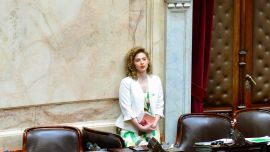Jujuy Province Governor Gerardo Morales says his style of government has more points of contact with Córdoba’s Juan Schiaretti and San Juan’s Sergio Uñac than with María Eugenia Vidal and Horacio Rodríguez Larreta. Even so, he maintains that the unity of Juntos por el Cambio is essential for the future. Morales believes in an agreed plan to smooth out the differences within the coalition between its more liberal and Keynesian sectors.
On Twitter, you congratulated your fellow-Radicals in Santa Fe and Río Negro on their results, as well as the great election for Facundo Manes in Buenos Aires Province. Are you acting as the national leader of the Radical party?
I’m not there yet. If the delegates and the structure of my party so decide in December, I’ll be the Radical party chairman once again. One of the most important honours for a Radical is to chair the party. I am indeed a leader who has gone everywhere nationwide, not just as senator but as party chairman. I feel the party colleagues in different places and the challenges they face as my own, accompanying them from afar because I have the responsibility of governing the province of Jujuy, which is very time-consuming.
In Mendoza there is no re-election and [current Radical party chairman] Alfredo Cornejo could run again for governor.
He could. I don’t know what Alfredo’s plans are but he is an important and prestigious leader recognised in Mendoza and also nationwide. There is an important agreement between [Senator] Julio Cobos and [Governor] Rody Suárez, all Radicals, with a very powerful list in Mendoza. I guess that if he [Cornejo] does not want to be governor again, he’d be a possible presidential candidate, which is the most important thing. Over and above my own presidential aspirations, it’s crucial to have a Radical presidential candidate with important work in these next two years within the framework of Juntos por el Cambio.
Facundo Manes said that it was Radicalism which defeated Kirchnerism in the last elections with Buenos Aires Province, the district with the most votes, placing the full stop on the government defeat and that without the competition between the Radicals and PRO, [government candidate] Victoria Tolosa Paz very probably would have won.
I share Facundo’s opinion. It played a central role, not only in Buenos Aires Province, headed by a Radical party back on its feet. There was a nationwide spillover generating great energy in every province. But nobody can lay claim to ownership of this triumph, nobody in Buenos Aires City or Province, nobody in the Radical or PRO party, nor any governor.
Will this result be repeated in November?
The result is never the same.
Will it be better or worse?
It’s important not to fall into overconfidence, which would be an error. You’ve got to keep your feet on the ground. This is a basically Peronist government which is reacting via its many governors, among whom my northern neighbours have only November 14 on their minds. Their party machines will be working at full steam.
Will that narrow the difference?
Maybe or maybe not, I don’t know. Rather than confidence, we need to maintain as much cohesion and unity as possible. We’ve recently had Juntos por el Cambio meetings with Radicals facing off against PRO and also Radical meetings with Radicals confronting fellow-Radicals over different lists. The key word is cohesion and to keep working elbow to elbow with the people against what’s wrong so this election continues to serve notice to the government as to the need for real changes, not cosmetics.
What is the difference between the coalition in Jujuy, which includes Peronists, and that of Santiago del Estero’s Gerardo Zamora, who is also Radical but within Frente de Todos. Is the difference cyclical or does it lie in thinking?
We think differently. I do not see myself accumulating anything resembling Kirchnerism for my province. Kirchnerism makes the difference because our front Cambia Jujuy has many Peronists.
Would you say that, like Gustavo Valdés in Corrientes, your style of leadership is closer to Sergio Uñac in San Juan or Juan Schiaretti in Córdoba than to María Eugenia Vidal or Horacio Rodríguez Larreta in Buenos Aires Province and City respectively?
That’s correct. There are different visions of the country. The instrument of the coalition can generate expectations of change and alternation for 2023. We must sort out our differences via a plan of government, which neither our coalition nor the government now have. The similarities have to do with questions of federal thinking, with the needs of the country inland.
Which could be defined as anything not porteño?
Maybe. I have many friends in Buenos Aires, which is the visible face of the Argentine Republic. It’s a city loved by all of us inland but there is also such a thing as a porteño bias which does not understand the Argentine Republic.
Did this porteño political bias get in the way of both Mauricio Macri and Fernando de la Rúa?
Exactly, and also in the way of some Peronist sectors. That’s why 2023 could represent an opportunity. We have to be very responsible and reach power with a plan because we have to break out of this retrograde system of alternation.
How would that be?
We came out of the last years of Cristina’s presidency to make a change but we reached power without a plan and disappointed much of Argentine society. We must analyse that fact, which some sectors of Juntos por el Cambio would rather elude. To me it seems central to build and not to reach office and make a mess again, followed by Alberto with Cristina again, also without a plan.
Would you see the returns of Cristina or Mauricio Macri as equally retrograde?
We would always be moving back. I wouldn’t vote for Mauricio. He’s angry with me and hasn’t wanted to talk to me for months but what I have to say is not to make him angry. We cannot experiment again without a vision or plan – that “I’m in charge” without cohesion or debate over ideological differences. Not Mauricio again, no.
Is Radicalism the progressive wing of Juntos por el Cambio?
Of course.
So should Juntos por el Cambio be shifted in that progressive direction?
It should be shifted towards the progressive centre. That’s why a strong Radicalism is important. I envisage a more symmetrical relationship within Juntos por el Cambio. For that our attitude as a party is the key. The electoral result places us in a much more symmetrical relationship with PRO.
How do you see the situation of Mauricio Macri, Patricia Bullrich and Horacio Rodríguez Larreta within PRO infighting?
There is a crisis of leadership within PRO, a product of the 2019 defeat and the emergence of leaders like Horacio [Rodríguez Larreta] and Patricia [Bullrich], who have their differences. Both want to be president of Argentina and they have every legitimate right. It seems fine to me that this is happening within Juntos por el Cambio because it gives us more energy, as does the fact that we Radicals also want to be President.
You didn’t mention Mauricio Macri.
Mauricio is a personal and political reality. I do not agree with his being president again but neither do I want to pension him off. The tussle for leadership is between Horacio and Patricia.
Who will win?
I don’t know. I don’t want Radicalism to take over ownership of Juntos por el Cambio. I envisage us as part of the train and not the caboose.
What did you think when Mauricio Macri said that he agreed with the liberal ideas of Javier Milei?
I don’t share that view. Having PRO is moving sufficiently to the right. That’s a debate we need to have. Many PRO sectors agreed with incorporating José Luis Espert and Javier Milei. That would imply mixing oil and water. Mixing Radicalism and Peronism is not mixing oil and water but that is.
If Milei said that Rodríguez Larreta was, verbatim, a “shit leftist,” how would he see Radicals?
As Marxist-Leninists, surely.
And also Trotksyists.
[Laughs] You bet.
How do you interpret his electoral performance?
It’s an expression of the anti-political reactions which arise when there are no answers forthcoming from either politicians or the government, another effect of this retrograde alternation – going backwards without resolving the problems of the economy, inflation or the people. That circle must be stopped and you do that with a plan. Otherwise sectors emerge which see politics as engrossed by the grieta chasm with people like that [Milei] to represent them. It’s a wake-up call for the political leadership.
Does he represent rage more than an ideological current?
Both things but the trigger is the protest vote and dissatisfaction.
Should the next president come from inland or could he come from Buenos Aires Province or City?
I’d like the next time to be an inland president with a plan and a real outlook on the country. We are undergoing situations of injustice. Industries in northern provinces pay US$7 per million BTU to produce and US$3 in the rest of the country. Subsidies continue to be concentrated in the Buenos Aires Metropolitan Area, which pays five times less for its electricity than inland.
In some ways Buenos Aires inhabits a different country from what we feel and experience inland. The time has come for another outlook. Nothing is guaranteed if there is no plan and diversified structures.
The UCR [Radical] National Committee, via Alfredo Cornejo and Alejandra Lorden, have made a statement on the crisis within Frente de Todos saying: “This situation reflects what we have been warning about. Frente de Todos is a fragile coalition without any kind of internal agreement. They just came together to conquer power and hang onto it.” Do you agree?
The government coalition is fragile. You don’t know who is in charge in some ministries. It continues to be a coalition of Kirchnerites, presidential supporters, the Renewal Front, social organisation and trade unions. There is a big tussle for a power without leadership. I see that as a governor. Even so, some ministries are a bit more orderly than others.
Did you speak to President Alberto Fernández after his electoral defeat?
Not with him. I spoke to some officials and ministers.
Off the record many Peronist leaders are saying that both Alberto Fernández and Cristina Fernández de Kirchner made Juan Manzur the Cabinet chief because they need to win the northern provinces.
I see a northern strategy, yes. I don’t know if that’s why they brought in Manzur but I do see a strategy of improving the results in the North and also in Greater Buenos Aires.
Did the photo of the president at the first lady’s birthday party in Olivos impact the electoral results in the PASO primary?
Yes, because it affected the credibility of the president. This post-electoral crisis has also weakened the presidential figure.
What role do the traditional Peronists entering the Cabinet, such as Juan Manzur, Julián Domínguez or Aníbal Fernández, occupy?
That was the presidential response to his vice-president’s challenge.
Was it a defensive measure or adjusting to the situation?
Adjusting to the vice-president.
Did he give her all she wanted?
In part, yes. All that noise carried a political cost for the president.
The “governance report” of the province of Jujuy shows huge social spending for 2020, especially on health. Did the national government prioritise cutbacks and that had electoral consequences, unlike what you did in Jujuy?
We took a different attitude to the pandemic. We kept the economy. That’s why the new Cabinet chief upon taking charge decreed the end of the pandemic with everybody back in action. You have to be careful with that. I never locked down at 7pm or 8pm like in Buenos Aires City. Shutting shop at 8pm was an invitation to go out and get infected at social encounters. Besides, we have a good fiscal situation, a balanced budget. We ploughed important funding into different programmes, plans, public works and helping out various activities such as tourism, one of the hardest-hit sectors. The national government could not handle the macroeconomic issues because it had no plan.

‘Cannabis will bring us more revenue than lithium and renewable energy put together’
You said that “cannabis is virtuous, fantastic, tremendous.” What does it mean for Jujuy Province?
We have authorised planting 35 hectares with plans to increase that to 600 more. We’ve already purchased the drying plant in Europe while a lab is coming here from the United States to add to the pilot lab we’ve had for over a year now. We’ve already managed a ton of plants in bloom with another ton set to be produced from the initial plantation of 35 hectares and then 15 tons. In late September we’ll be providing public hospitals with oil to apply to cases of refractory drug-resistant epilepsy. Then we have an agreement with Universidad Austral for application as a cancer pain-killer.
None of these uses is psychotropic or psychiatric.
It’s CBD (cannabidiol). Cannabis has THC (tetrahydrocannabinol), which is the cannabinoid psychotropic component and CBD, which isn’t. A few weeks ago it was authorised for over-the-counter sale in Europe so that with CBD we’re already manufacturing cannabis oil.
Is it correct to compare it with soy?
There are 600 hectares employing almost 2,000 workers which will rise to 8,000 in 2023, according to plan – that’s more workers than the entire tobacco industrial complex. I hope that in the next five or seven years it comes to substitute tobacco as the alternative. There we have 15,000 workers but only two or three months a year while the 8,000 in cannabis work all the year round. The company is public with 600 hectares, yielding us more revenue than lithium and renewable energy put together. We estimate invoicing US$250-300 million with a profit of around US$200 million.
Will it be Jujuy’s main source of wealth?
More than lithium and any farming produce. As from March or April next year we’ll be summoning the private sector to invest. In five or seven years it should be substituting the production of tobacco, which is a challenge. By the end of the year we’ll have a project for the production of bioplastics while with the 35 hectares, we’ll have 15 tons of hemp since only the flower is used for oil. This hemp can be used for bioplastics, paper and textiles.You can imagine what that implies for our handicrafts artisans in Purmamarca and Tilcara.
Will there be ponchos made of cannabis?
A poncho with cannabis fabric. That opens up a different scientific and technological challenge, which is what happened to us with lithium.
Until 10 years ago the province lived off tobacco. Lithium and cannabis have changed the paradigm.
And renewable energy. We’ve got a 300-megawatt plant.
Renewable energy is a nationwide question.
We’re among world leaders for solar radiation. Salta and Catamarca are important for lithium too. We have the commitment of a Chinese company and an Italian company to manufacture lithium batteries when there is electric mobility.
So you’d have lithium as a raw material and the battery as the manufactured product?
We produce lithium carbonate. To arrive at a lithium battery, you need to activate the lithium carbonate. Then you have to process it, which is another stage, and then the third, lithium-ion cells and litter and the whole ensemble of batteries.
How many countries in the world do that?
The second stage of activating the material is limited to 10 countries.
Does that include those two other lithium powers, Bolivia and Chile?
No. Chile was always more advanced but has not reached the manufacturing stage yet, it doesn’t have the technology. Bolivia lags behind us. We have a more important scientific and technological development than Chile. We’ll be within that select group of countries manufacturing lithium batteries at every stage.
[Productive Development Minister] Matías Kulfas was one of those promoting the development of the cannabis industry and at the same time is one of the ministers criticised by Cristina Fernández de Kirchner. How was your own experience with him?
Very good. He’s also pushing electric mobility, the direction in which the world is going and in which Argentina should be going. In 2050, if we don’t do anything, the temperature in Jujuy will rise five to seven degrees. Our Cauchari solar plant is like taking 200,000 cars burning fuel and generating carbon emissions out of circulation. And lithium and lithium batteries are the best accumulators of energy for electric mobility. Argentina must form part of the changes in the global energy matrix and in transport. We have the Girsu project financed by the European Investment Bank. We receive a subsidy of 11 million euros from the European Union and we have already eliminated 16 open-air rubbish dumps while in two years we will eliminate almost 70 in the province. The third factor behind the emission of greenhouse gases in the province of Jujuy is the poor treatment of solid waste. That’s the path, for the province and for Argentina. We’re doing that with a plan of electric mobility, obliging auto companies to come up with designs of electric cars, generating that change so that in 20 years all cars will be electric. Besides, it’s more economical while the scientific and technological development of the batteries grows. A cell battery which today lasts 24 hours will last five days one or two years from now so that a Tesla which currently has an autonomy of 300 kilometres will have 1,500 with that new version of battery. It’s a revolutionary change, something virtuous and good for the planet.
Like Joe Biden’s green Marshall Plan.
The cannabis plant is something which does most to eliminate carbon emissions. However you look at it, it is virtuous.
Instead of that “weed” soy, we’re facing a magic plant here.
We have a great potential. Apart from tax measures, the country will resolve its economy from the outside looking in with a plan for 10 to 15 years from now.
You return to the theme of planning.
Every Argentine must be an entrepreneur at heart and for that to happen you need a state with a plan which develops that entrepreneurial spirit with all its energy. The market does not do that alone, it is achieved by a country with a plan.
'Juntos por el Cambio should shift towards the progressive centre'
For whom would you have voted for in Buenos Aires City, the Juntos por el Cambio list including Martín Tetaz and headed by María Eugenia Vidal or the one topped by Adolfo Rubinstein?
I backed Adolfo Rubinstein, who expresses my thinking. It wasn’t right. We Radicals have to make Martín Tetaz and [Senator] Martín Lousteau feel that they belong and debate the place of Radicalism within the coalition.
Alfredo Cornejo has often sided with PRO hardliners. Do you feel represented by Alfredo’s economic thinking?
At times we agree and at other times not. We form part of different sectors although that’s perhaps not so formalised and now we must all pull together with conviction for November 14.
Facundo Manes differentiates himself from PRO by speaking of a popular centre, adding progressives like Margarita Stolbizer and Peronists like Emilio Monzó and Joaquín de la Torre. Does that represent you more than the party leadership?
Within Juntos por el Cambio I feel most identified with that construction in Buenos Aires Province. It should transcend provincial borders and the path of Radicalism.
Would it be exaggerating to say that you are the Radical leader who agrees most with Manes?
We agree, think alike and he’s the one with whom I find the most similarities. But also with Ernesto Sanz, Luis Naidenoff and Gustavo Valdés, who, apart from being a great governor [of Corrientes], is a friend.
So you and Manes are the ones most in the middle within Radicalism?
I don’t want to exclude many other leaders but with Facundo we think that way. What he did in Buenos Aires Province should be replicated nationwide. We’d be contributing improvements to Juntos por el Cambio and resolving issues within the framework of a plan of government which Juntos por el Cambio still lacks.

















Comments